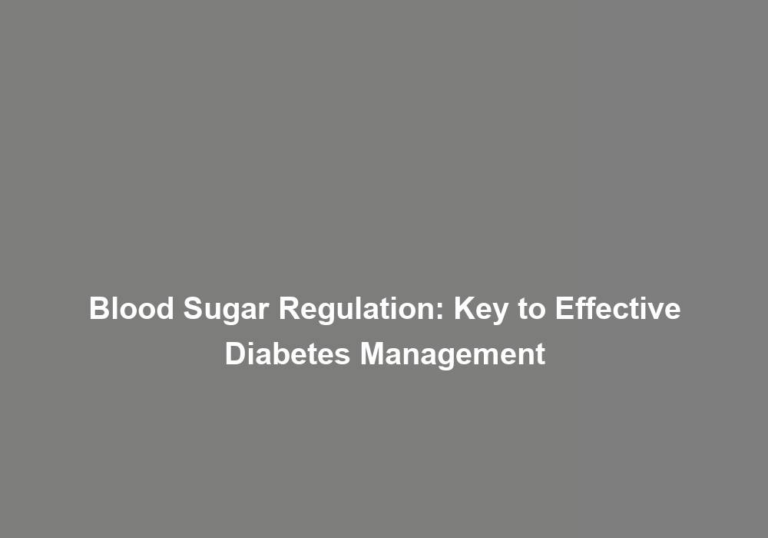Mastering Diabetes Management with Blood Sugar Control
Managing diabetes through effective blood sugar control is crucial for your overall health. Did you know that approximately 34.2 million people in the United States have diabetes? With the right strategies, you can take charge of your diabetes management and improve your quality of life. By understanding the impact of blood sugar levels, making informed dietary choices, incorporating physical activity, monitoring and managing medications, and prioritizing stress management and sleep quality, you can gain the upper hand in managing diabetes. These strategies will not only help you control your blood sugar levels but also empower you to live a healthier, more fulfilling life.
Understanding Blood Sugar Levels
Understanding the significance of blood sugar levels is crucial in effectively managing diabetes and maintaining overall health. Glucose regulation plays a pivotal role in keeping blood sugar levels within a healthy range. When you eat, your body breaks down carbohydrates into glucose, which enters the bloodstream and raises blood sugar levels. In response, the pancreas releases insulin, a hormone that helps cells absorb glucose for energy. However, in individuals with diabetes, this process is disrupted, leading to high blood sugar levels. Insulin sensitivity, or the bodyG??s response to insulin, is a key factor in this process. When cells become less sensitive to insulin, glucose absorption is impaired, leading to elevated blood sugar levels.
Research has shown that maintaining optimal blood sugar levels is essential for preventing diabetes-related complications. High blood sugar levels over time can damage blood vessels and organs, increasing the risk of heart disease, stroke, kidney disease, and vision problems. On the other hand, low blood sugar levels can lead to symptoms such as dizziness, confusion, and in severe cases, loss of consciousness. Therefore, achieving a balance in blood sugar levels is vital for overall health and well-being.
Importance of Dietary Choices
To effectively manage your blood sugar levels and maintain overall health, making informed dietary choices is crucial. Healthy eating plays a significant role in managing diabetes. It is essential to focus on a balanced diet that includes a variety of nutrients to help control blood sugar levels and prevent complications. Proper nutrition education and meal planning are key components in achieving this balance. Below is a table to help you understand the components of a balanced diet for diabetes management:
| Food Group | Examples | Role in Diabetes Management |
|---|---|---|
| Complex Carbs | Whole grains, legumes | Provide steady energy and fiber |
| Lean Proteins | Chicken, fish, tofu | Help maintain muscle and control hunger |
| Healthy Fats | Avocado, nuts, olive oil | Support heart health and aid in nutrient absorption |
| Non-Starchy Vegetables | Leafy greens, broccoli | Low in calories and high in nutrients |
Incorporating these food groups into your daily meals can help manage blood sugar levels effectively. Furthermore, meal planning and portion control are crucial for diabetes management. A balanced diet not only supports blood sugar control but also helps in maintaining a healthy weight and reducing the risk of other chronic conditions. By making informed dietary choices and embracing healthy eating habits, you can take control of your diabetes and improve your overall well-being.
Incorporating Physical Activity
Incorporate regular physical activity into your daily routine to effectively manage your blood sugar levels and improve overall health outcomes. Engaging in physical activity has numerous benefits for individuals with diabetes. HereG??s why and how to get started:
- Exercise Benefits:
- Physical activity helps your body use insulin more efficiently, which can lead to better blood sugar control. It also lowers your risk of heart disease, helps with weight management, and improves overall fitness. Regular exercise can also enhance your mood and reduce stress, which are important aspects of diabetes management.
- Physical Activity Recommendations:
- Aim for at least 150 minutes of moderate-intensity aerobic activity per week, such as brisk walking, swimming, or cycling. Incorporate strength training exercises at least two days a week to work all major muscle groups. Additionally, consider breaking up sitting time with short bouts of physical activity to further improve blood sugar levels.
- Getting Started:
- Start slowly and gradually increase the intensity and duration of your physical activity. Consult with your healthcare team before starting a new exercise regimen, especially if you have any existing health concerns. Consider finding an activity you enjoy and can incorporate into your daily routine to make it more sustainable.
Incorporating physical activity into your life can significantly impact your diabetes management. By following these recommendations, you can experience improved blood sugar control, enhanced overall health, and a greater sense of well-being.
Monitoring and Medication Management
Maintaining regular monitoring of your blood sugar levels and effectively managing your medication regimen are crucial components of diabetes care to ensure optimal health outcomes. Medication adherence plays a pivotal role in managing diabetes. It is essential to take your medications as prescribed by your healthcare provider to control blood sugar levels. Missing doses or not following the prescribed regimen can lead to fluctuations in blood sugar levels, which can have detrimental effects on your overall health. Additionally, incorporating glucose monitoring technology, such as continuous glucose monitors (CGMs) or flash glucose monitoring systems, can provide valuable real-time data to help you make informed decisions about your diabetes management. These devices allow you to track your blood sugar levels throughout the day, providing insights into how your body responds to food, physical activity, and medication. By regularly monitoring your blood sugar levels, you can identify patterns and make adjustments to your medication regimen as needed, under the guidance of your healthcare team. This proactive approach to monitoring and medication management empowers you to take control of your diabetes and make informed decisions that contribute to better health outcomes. Remember, open communication with your healthcare provider about your medication adherence and the use of monitoring technology is crucial for optimizing your diabetes management plan.
Stress Management and Sleep Quality
Improving stress management and sleep quality is essential for maintaining optimal health outcomes in diabetes management. Both stress and poor sleep can negatively impact blood sugar levels, making it crucial to prioritize these aspects of your health. Here are three key strategies to help you effectively manage stress and improve sleep quality:
-
Relaxation Techniques: Engaging in relaxation techniques such as deep breathing, progressive muscle relaxation, or yoga can help reduce stress levels. These practices promote a sense of calm and can have a positive impact on blood sugar control. Mindfulness meditation is also effective in managing stress and has been shown to improve glycemic control in individuals with diabetes.
-
Sleep Hygiene: Establishing good sleep hygiene habits is essential for quality rest. This includes maintaining a consistent sleep schedule, creating a relaxing bedtime routine, and optimizing your sleep environment. Avoiding electronic devices before bed and ensuring your sleeping area is dark and quiet can significantly improve the quality of your sleep. Additionally, meditation before bedtime can help calm the mind and promote better sleep.
-
Physical Activity: Regular physical activity can reduce stress and improve sleep quality. Engaging in activities such as walking, cycling, or swimming not only helps manage blood sugar levels but also contributes to overall well-being. Aim for at least 150 minutes of moderate-intensity exercise per week, as recommended by health guidelines.
Incorporating these strategies into your routine can significantly impact your diabetes management by reducing stress levels and enhancing the quality of your sleep, ultimately leading to better blood sugar control.
Conclusion
In conclusion, managing diabetes is like driving a car. You need to constantly monitor your speed (blood sugar levels), make sure you have enough fuel (healthy dietary choices), and keep your engine running smoothly (physical activity and medication management). Just like a well-maintained car runs smoothly, mastering diabetes management with blood sugar control can lead to better health outcomes and a more fulfilling life. So, buckle up, stay vigilant, and enjoy the ride!







